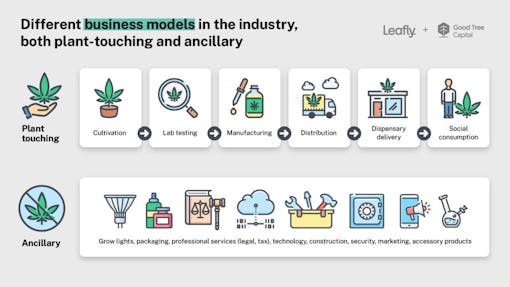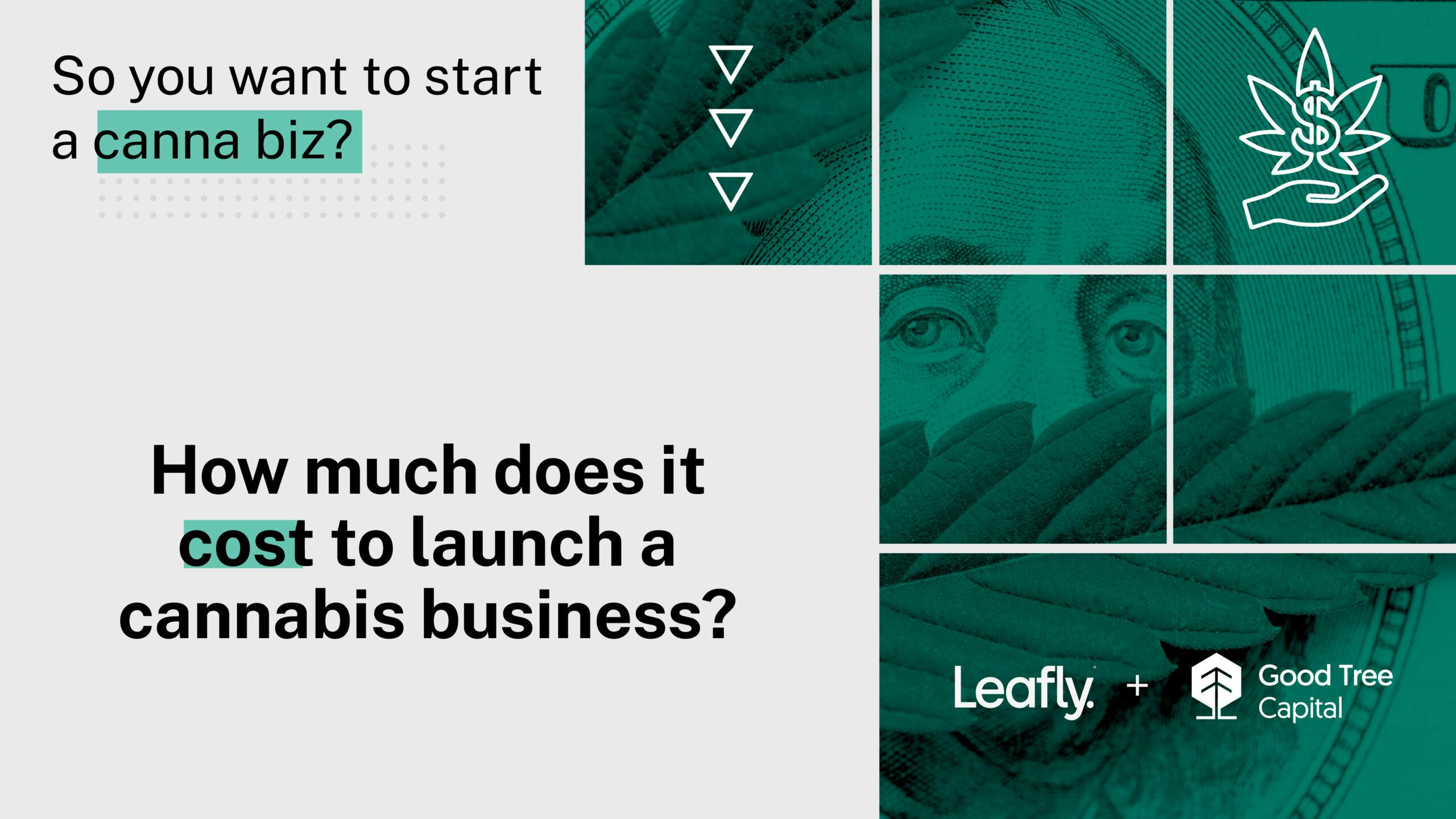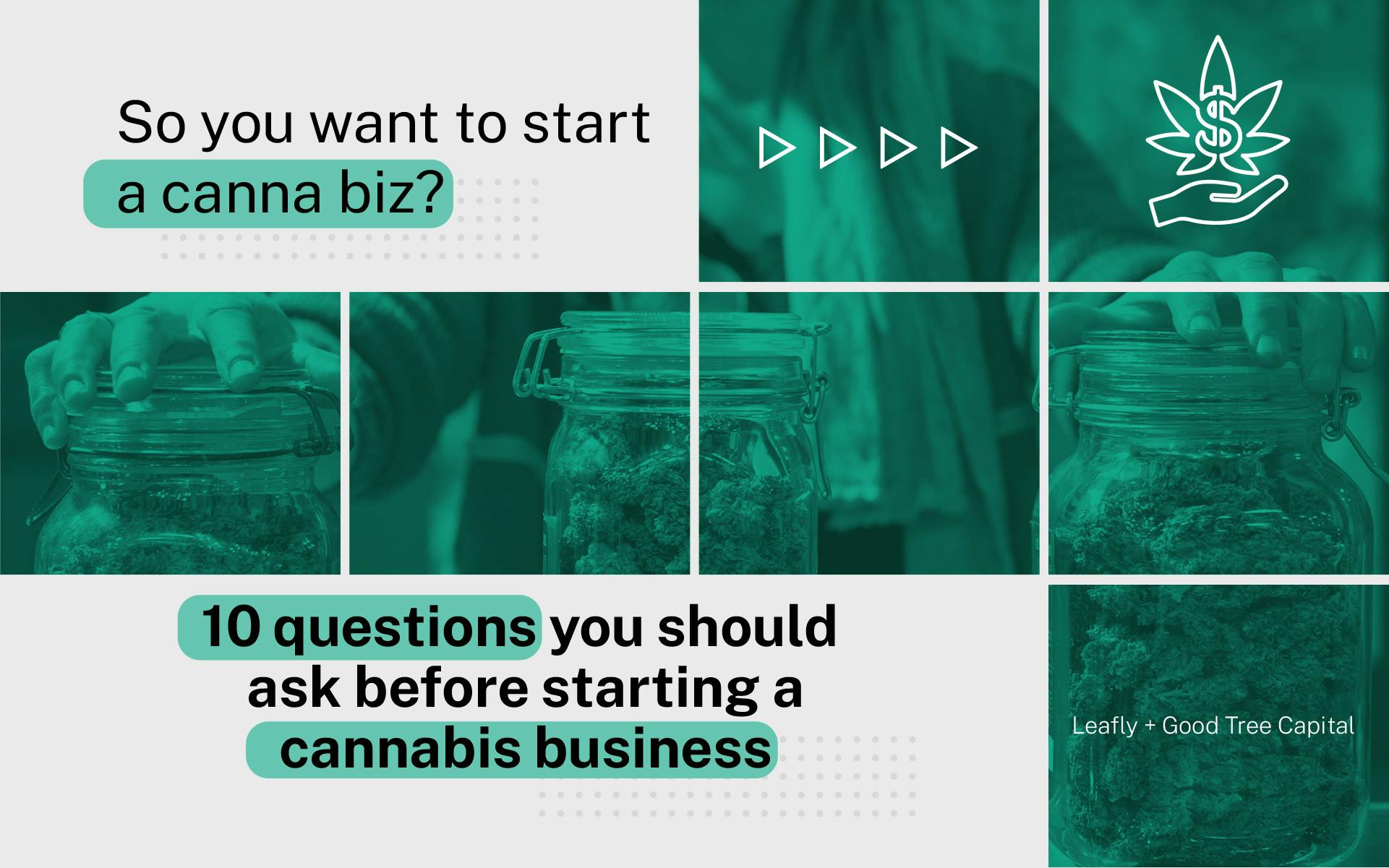This article is the fourth in a series called, “So you want to start a canna biz?” created in partnership with Good Tree Capital. This article focuses on different types of cannabis businesses.
As the cannabis industry takes shape, the wide array of businesses that make up the industry really come into focus. As we explained in the first article of the series, while people often think dispensaries are the golden ticket into cannabis, they don’t realize that there is so much more opportunity in this emerging industry.
Learn the types of cannabis businesses

There are only two major distinctions between the types of businesses in the cannabis industry: those that touch the plant, and those that do not.
- Plant-touching businesses handle cannabis (the raw flower, infused products, etc) directly and are required to be licensed by the state.
- Non-plant touching businesses (also referred to as ancillary businesses) are those that provide products or services that support the industry, but do not directly handle products. Some business licensing may still be required.
Plant-touching cannabis businesses
Plant-touching businesses require licenses and are governed by the rules and regulationsin each state.
Cultivation
Cultivation businesses are those that breed, grow, and harvest cannabis. They supply raw flower to dispensaries to be consumed in plant form or to processors & manufacturers for THC/CBD extraction.
Laboratory testing and research
Cannabis testing labs determine the chemical makeup of cannabis products, usually defining the THC and CBD potency, as well as quality testing the product to ensure it is safe to sell to consumers.
Processing and manufacturing
Manufacturers extract THC and/or CBD from raw flower and turn it into a broader array of products for end-user consumption, such as edibles, vape cartridges, topicals, tinctures, etc. They supply dispensaries with manufactured products.
Distribution
Distributors transport cannabis flower and manufactured goods from point to point in the supply chain. When cultivators harvest the plant, distributors transport it to laboratories for testing. When laboratories test the plant, distributors transport the tested plant to processing & manufacturing or to dispensaries.
Dispensaries and delivery services
Dispensaries and delivery services are the only business-to-customer license types because they sell products to the end-user, either from a retail location or through delivery capabilities. Dispensaries source inventory wholesale from cultivators or from processors & manufacturers.
Some states are opening up new possibilities for delivery services as a social equity opportunity and to help create new business within established licensing measures.
Social consumption
These businesses are entities where you can consume cannabis products on-premise, typically in the form of lounges or private venues. Relatively few states have this license type.
Bonus tip: make sure you understand your market
For entrepreneurs who are interested in building a plant-touching business, it is important to understand the market. Every state has its own rules and regulations that govern license types and quantities.
The availability of licenses can have drastically different outcomes on your projected profitability and growth, and hence the decision as to whether you should go for it.
Take Oregon and Massachusetts as cases in point. When recreational cannabis was approved in Oregon, the state awarded 2,100 grower licenses alone. The oversupply of cannabis led to a precipitous decline in prices, devastating supply chain revenue generation prospects.
The surplus of weed was so vast that it would take an estimated 6.5 years to sell it all without any additional cultivation. Massachusetts, on the other hand, had a much more restricted license rollout with only 787 licenses awarded across the entire supply chain.
Although that’s fewer than half of the total number of licenses in Oregon, Massachusetts cannabis sales exceeded $1 billion dollars in under two years; it took Oregon six years to cross that threshold.
Ancillary cannabis businesses
By comparison, ancillary businesses don’t touch the plant, and therefore don’t face the licensing and regulatory hurdles of plant-touching businesses. Ancillary businesses offer the sorts of products and services that non-cannabis businesses and everyday people engage with regularly.
Construction
There are small, local general contracting businesses that have been building out commercial and residential developments in their communities for decades. Now, there is an opportunity to apply old skills to a new and booming industry.
State regulations are often very prescriptive about what features must be built into licensed facilities. Controlled entry and exit, mantraps, and the locations of the product and cash vaults are just a few examples.
General contractors who learn their state’s cannabis-specific building regulations and specialize in incorporating these rules into construction projects will be in very high demand, particularly among dispensaries.
Packaging
Packaging businesses provide containers, baggies, bottles and wrappers for cannabis products. At a minimum, packaging needs to be compliant, with child-proof protections and labeling that makes the appropriate disclosures.
Sourcing cost-effective packaging is a big challenge for the industry and, increasingly, we are seeing more demand for innovative alternatives that are aesthetically appealing, eco-friendly, and sustainably sourced.
Professional services
Specialized professional services are hugely important throughout every part of the cannabis supply chain. These include lawyers and accountants who use their understanding of cannabis laws and tax strategies such that you structure your business for long-term success while minimizing your tax expense.
Also included are marketing experts who can help you build a distinctive brand in a rapidly commoditizing industry. These are just a few.
Technology products
Technology products enable cannabis operators to run their businesses efficiently. For example, seed-to-sale software allows cannabis businesses to track inventory at each stage in the supply chain, from when it’s harvested all the way to the point-of-sale to the customer, and report to regulators.
Some tech entrepreneurs are using code to manage everything from point-of-sales and employee training modules to customer relationship management and product delivery, all of which need specialized solutions given the unique characteristics of the cannabis industry.
Accessories
Whether you are new to consuming cannabis, or a connoisseur, every customer needs some form of accessory to compliment their smoking experience. There is a huge market for paraphernalia, ranging from glassware like pipes and bongs, or artisan goods like ashtrays and stash boxes.
The key takeaway is that you can apply your existing expertise to this emerging industry, and without all of the fuss associated with obtaining and maintaining a license. The opportunity among ancillary businesses is abundant; the question is are you able to play to your strengths.
Carve out your niche in cannabis
Carving out a niche that will grow with the industry is driven by understanding your target market, but also understanding what you bring to the table. To hone in on the answer, ask yourself:
- Where do you have unique expertise and experience?
- What are all the ways in which your expertise is transferable into the industry?
- What resources do you have at your disposal? Teammates, staff, capital, equipment?
In contemplating these questions, you may find that you have the necessary tools to support the industry in ways that are unique to your strengths. It’s not a matter of if you can fit into the industry, but how you can fit into the industry.
It may feel daunting, but always remember that it is anybody’s game at this juncture. It is just the beginning in the cannabis industry, and the players who establish themselves today will own the future.
Some liken the emergence of cannabis to the trajectory experienced by the alcohol industry post-prohibition.
It took decades for the alcohol industry to transform itself into what we see today including: breweries and distilleries, bars and lounges, wine tastings and beer gardens, 6-packs at the convenience store, and so much more.
Years of creative ideas, innovative endeavors, and successful concepts made that industry what it is today. As a prospective canna biz owner, that same power is in your hands!









